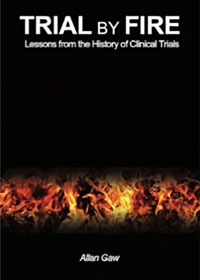Trial by Fire is a wonderful short but poignant book regarding the historical birth of clinical trial aspects such as randomisation, consent (or abuse of), placebo effect, the need to publish and the importance of respecting the rights of patients. With wit and intelligent story telling, Allan Gaw uses hard to extract documents from historical archives in the developing, predominantly western world to keep the reader enthralled, captivated and appreciative of each stage of development of what we now call the randomised controlled clinical trial involving consenting adults. He chooses wisely six key examples from history to demonstrate the key aspects of trial design. These involve well-known figures such as Queen Cleopatra the VII and Benjamin Franklin, who show us the importance of consent and blinding, and lesser known figures such as Van Helmont and Anton Mesmer, who teach us about bias and the placebo effect.

Author: Gaw A
Publisher: SA Press, Glasgow, 2009
ISBN: 978-0956324207
Price: £7.99 (+£2.00 p&p)
Indeed, he even tackles the thorny, painful side of trials from the Tuskegee syphilis study in the USA to experiments on prisoners of World War II in Germany. While the book is short and almost ends abruptly, the author serves the purpose with which the book was born – to share the lessons of the past to avoid the same mistakes in the future. The book is clearly of interest to anyone undertaking, designing or commissioning clinical trials, especially those teaching about importance of good design and sound ethics in this area. The book is an ideal brief read for those travelling to a conference or a clinical trial investigators” meeting, who will find this material relevant, interesting and perhaps, more importantly, thought provoking. Above all, this material explains how many lives have been and are touched by clinical trials enabling medicine to advance.
